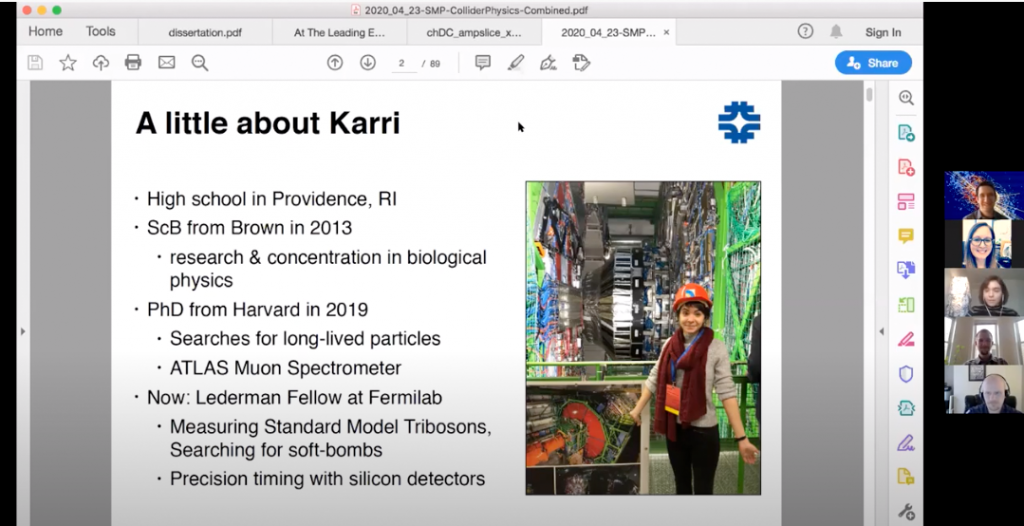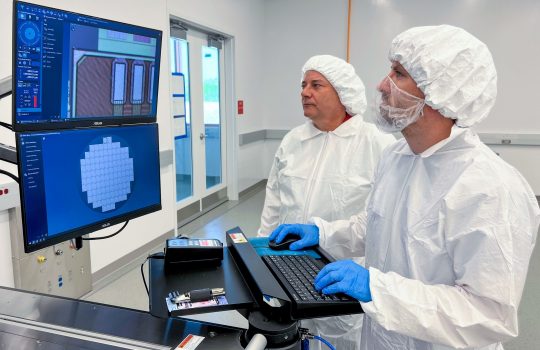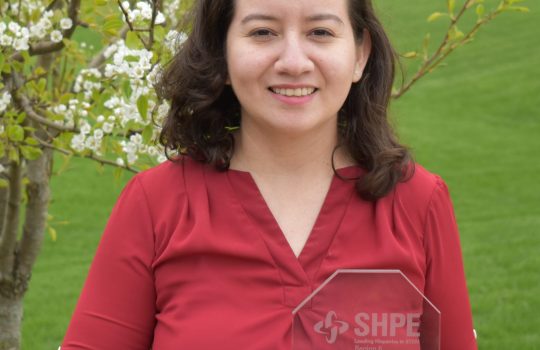In March, when Fermilab discontinued hosting the popular Saturday Morning Physics program on the laboratory site due to COVID-19 precautions, it was midway through the program’s spring lecture series. The program’s organizers began brainstorming how to keep their students engaged with Fermilab’s science projects as they continued their education from home.
Saturday Morning Physics is designed to inform high school students about the kind of big science projects that are conducted at Fermilab and introduce them to the scientists who make the projects happen.
“We want to expose them to those really big, cool science projects,” said Amanda Early, program manager for Saturday Morning Physics.
Many of the people who now work at Fermilab became hooked on science through a personal connection when they were young, according to Early.
“If you ask them what is it that made them want to go into particle physics or cryogenic engineering, a lot of times you’ll hear it’s that they were exposed to the science when they were younger,” she said.

Fermilab physicist Karri DiPetrillo helped organize the online version of the lab’s popular Saturday Morning Physics program. Image courtesy of Karri DiPetrillo
Personal experience
Along with teaching something about particle physics, Saturday Morning Physics also teaches the students something about who scientists are and what they do. Some of the lecturers focus on their academic background and their current research “to help students understand what it’s like to be a scientist and the path that they took to get there,” according to scientist Karri DiPetrillo, a Lederman fellow at Fermilab.
DiPetrillo studies particle physics at the CMS experiment, one of two large particle physics experiments at the Large Hadron Collider at CERN in Switzerland and France.
“There’s a lot of opportunity here,” Early added, “regardless of whether they end up working at Fermilab. Maybe they go on to do something else in a STEM field, but it’s valuable just letting them know the possibilities that exist.”
In mid-March, Fermilab restricted site access to essential on-site personnel in response to COVID-19.
“A few weeks after Saturday Morning Physics was canceled,” DiPetrillo said, “I was thinking about ways to get involved with the community and help while being safe and social distancing, and I thought, We can do at least some portion of the program virtually. We can do lectures virtually. We can do question-and-answer sessions about our paths to becoming scientists and what our day-to-day life looks like.”
She coordinated with Amanda Early of Fermilab’s Education and Public Outreach office, as well as Adam Anderson and Bryan Ramson, Fermilab physicists who co-direct the Saturday Morning Physics program.
Using Zoom for virtual lectures wasn’t much of a leap for DiPetrillo. She uses it often to communicate with the 3,000 other members of the CMS collaboration, who are scattered all over the world.
“We give presentations to our colleagues and talk over Zoom or video-equivalent technology all the time,” she said, “so we’re very used to interacting virtually.”
Certain portions of the in-person experience, such as hands-on activities or lab tours, could not be conducted online, but the lecturers did everything they could to give students the full Fermilab Saturday Morning Physics experience.
During the online lectures, the students could ask questions either by speaking up or by typing their question into Zoom’s chat function.
“They always ask excellent questions,” Early said.
“High school students are really great to work with,” DiPetrillo echoed. “They’re really receptive to new information and very curious.”
A legacy continued
For the classroom lectures, Saturday Morning Physics averaged about 90 students, according to Early. For the online lectures, the program hosted between 20 and 80 students live. The hosts then posted the lectures on the program’s website, where many more have since viewed the lessons, covering topics such as astrophysics.
Making the program available virtually allowed Saturday Morning Physics to broaden its audience. For the classroom lectures, the program directors had to place a cap on admission, and the students had to be willing and able to travel to the lab in Batavia, Illinois, by 9 a.m. on Saturday morning. For the online lectures, there are no limits on the number of students who can attend. In addition, any student with an internet connection can register and join the live lecture or view it later on YouTube.
Fermilab scheduled the classroom lectures for Saturday morning so they wouldn’t conflict with the students’ regular school attendance. While the schools were closed because of COVID-19, the Saturday Morning Physics lectures were actually held on Fridays. Parents were happy to have an additional educational activity to keep students busy while they were learning from home.
A follow-up survey brought in positive feedback on the online lectures. Parents said they were thankful that Saturday Morning Physics had found a way to provide the last four lectures their students otherwise would have missed.
Registration for the online fall session of Saturday Morning Physics will open Aug. 1. Lectures will be recorded and available for anyone to view.
“I feel really good about the fact that we can continue this program,” Early said. “This program was started by Leon Lederman 30-plus years ago to engage students in really cool science. Just being able to continue that legacy, regardless of what’s happening in our world at the moment, I think is so important and says a lot about the importance of the program and what it means for the lab.”
Fermilab’s education and outreach programs are supported by the Department of Energy Office of Science.
Fermilab is supported by the Office of Science of the U.S. Department of Energy. The Office of Science is the single largest supporter of basic research in the physical sciences in the United States and is working to address some of the most pressing challenges of our time. For more information, visit science.energy.gov.



